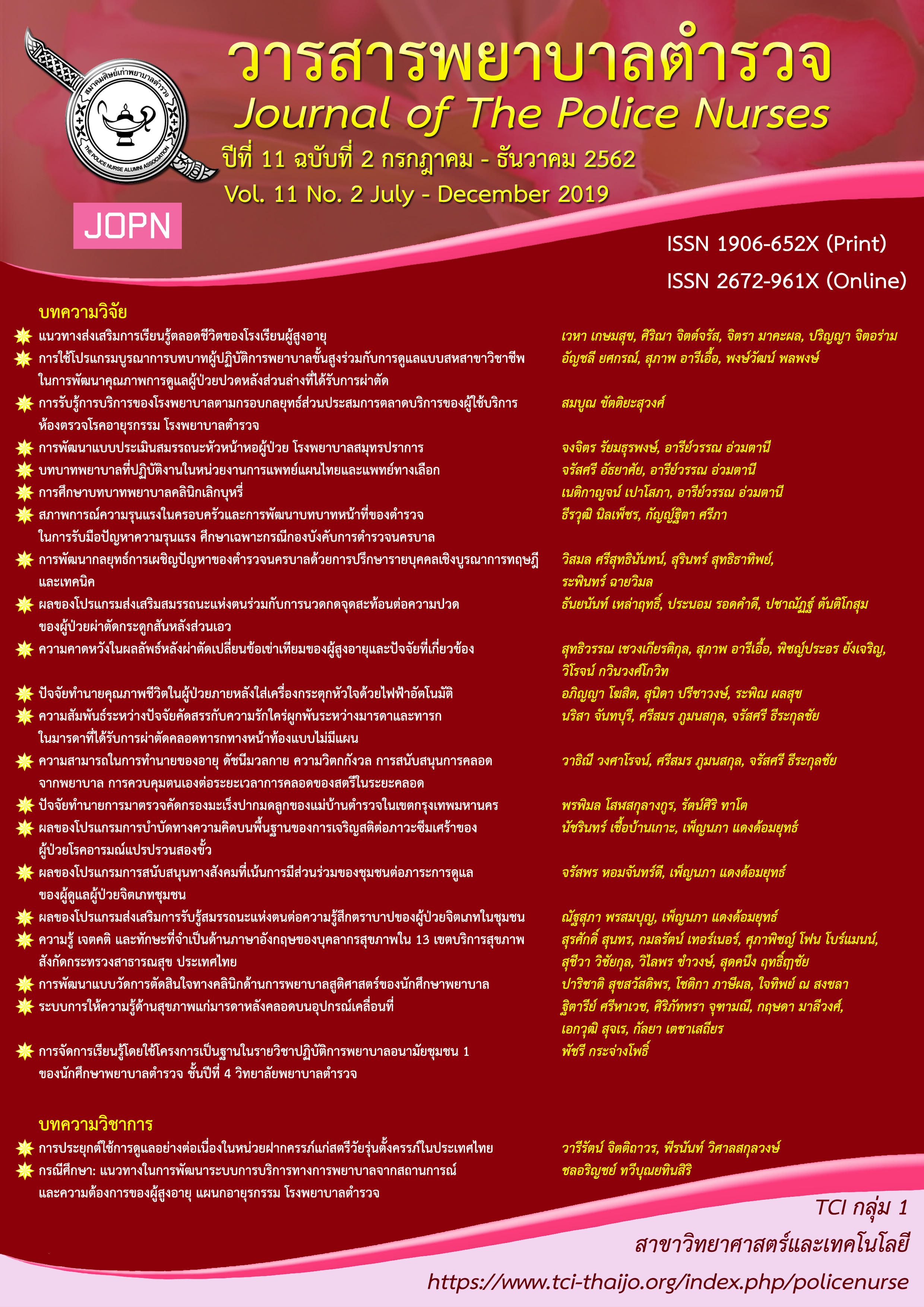THE EFFECT OF PROMOTING PERCEIVED SELF-EFFICACY PROGRAM ON SELF-STIGMA OF PERSONS WITH SCHIZOPHRENIA IN COMMUNITY
Keywords:
self-efficacy, self-stigma, persons with schizophrenia in communityAbstract
The purposes of this quasi-experimental research were to compare the self-stigma of persons with schizophrenia before and after participating in promoting perceived self-efficacy program, and to compare the self-stigma of persons with schizophrenia who participated in promoting perceived self-efficacy program and those who received regular nursing care. The subjects were forty persons with schizophrenia who received services in the outpatient department of community hospital who met the inclusion criteria. They were randomly assigned into one experimental group and one control group with 20 subjects in each by matching the age and brief psychiatric rating scale (BPRS). The research instruments were the promoting perceived self- efficacy program and the self-stigma of mental illness scale. These instruments were tested for content validity by a panel of five experts. The reliability of the self-stigma of mental illness scale was .87. Data were analyzed using descriptive statistics and t-test.
The research findings were as follows: 1) The self-stigma of persons with schizophrenia in the community after participating in promoting perceived self-efficacy program were significantly lower than those before at a .05 level (t = 10.39, p = .00). 2) The self-stigma of persons with schizophrenia in the community who participated in promoting perceived self-efficacy program was significantly lower than those who participated in the regular nursing care, at the .05 level (t = -5.82, p = .00).
Downloads
References
Khamphueng, A. (2009). Effect of the interpersonal communication skills training program on percieved stigma among persons with schizophrenia receiving services at Pichai Hospital, Uttaradit province (Thesis of master’s degree for psychiatric nursing). Faculty of nursing, Chaing Mai University, Chaing Mai.
Bandura, A. (1997). Self-efficacy theory. In V. S. Ramachaudran (Ed.), Encyclopedia of human behavior (pp. 13-38). New York, NY: Academic Press.
Boontoch, K., Saito, A. S., & Arunpongpaisal, S. (2013). Social support in patients with schizophrenia. Journal of the Psychiatric Association of Thailand, 58(1), 89-100.
Burns, N., & Grove, S. K. (2005). The practice of nursing research: Conduct, critique, & utilization (5th ed.). St. Loius, MO: Elsevier Saunders.
Crabb, J., Stewart, R. C., Kokota, D., Masson, N., Chabunya, S., & Krishnadas, R. (2012). Attitude towards mental illness in Malawi: A cross-sectional survey. BMC Public Health, 12, 1471-2458.
Dangdomyouth, P., Lue Boontawatchai, O., & Chanokporn, J. (2004). Stigma: Perceived and impact of schizophrenic patients and caregivers. Journal of Psychiatric Nursing, 18(1), 1-9.
Deepet, S., & Dangdomyouth, P. (2015). The effect of using empowerment program on self-stigma of persons with schizophrenia in community. The Journal of Psychiatric Nursing and Mental Health, 29(1), 123-138.
Fung, K. M., Tsang, H. W., Corrigan, P. W., Lam, C. S., & Cheng W. (2007). Measuring self-stigma of mental illness in China and its implicationa for recovery. International Journal of Social Psychiatry, 53, 408-418.
Hill, K., & Startup, M. (2013). The relation between internalized stigma, negative symptoms and social functioning in schizophrenia: The mediating role of self-efficacy. Psychiatry Research, 206, 151-157.
Jumpasri, W., & Dangdomyouth, P. (2012). The effect of using group supportive psychotherapy on perceived stigma of schizophrenic patients. The Journal of Psychiatric Nursing and Mental Health, 26(2),51-62.
Kerdpongbunchote, C., Punyayong, B., & Wong-Anuchit, C. (2015). Internalized stigma of psychiatric patients. Journal of Mental Health of Thailand, 23(1), 25-37.
Kleim, B., Vauth, R., Adam, G., Stieglitz, R. D., Hayward, P., & Corrigan, P. W. (2008). Perceived stigma predics low self-efficacy and poor coping in schizophrenia. Journal of Mental Health, 15(5), 482-491.
Livingston, J. D., & Boyd, J. E. (2010). Correlates and consequences of internalized stigma for people living with mental illness: A systematic review and meta-analysis. Social Science & Medicine, 71, 2150-2161.
Lortrakool, M., & Sukanich, P. (2015). Ramathibodi psychiatry. Bangkok: Faculty of Medicine, Ramathibodi Hospital.
Ruangtrakool, S. (2014). Psychiatric texbook. Bangkok: Ruankaew Printing House.
Singhasenee, U. (2009). Selected factors related to percieved stigma of schizophrenic patients (Thesis of master’s degree for psychiatric nursing). Faculty of nursing, Chulalongkorn University, Bangkok.
Thongsai, S. (2014). Care of schizophrenic patients in the context of Thai society sustainably. The Journal of Nursing Division, 42(3), 159-167.
Uchino, T., Maeda, M., & Uchimura, N. (2012). Psychoeducation may reduce self stigma of people with schizophrenia and schizoaffective disorder. The Kurume Medical Journal, 50, 25-31.
Yanos, P. T., Roe, D., Markus, K., & Lysaker, P. H. (2008). Pathway between internalized stigma and outcomes pelated to recovery in schizophrenia spectrum disorders. Psychiatric services, 59(12), 1437-1442.
Downloads
Published
How to Cite
Issue
Section
License
ผลงานที่ได้ตีพิมพ์แล้วจะเป็นลิขสิทธิ์ของวารสารพยาบาลตำรวจ















